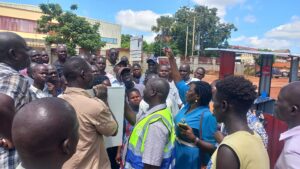
Kampala, the Capital City of Uganda is experiencing rapid growth, and has witnessed its population surge from 2,336,000 in 2013 to an estimated 3,846,102 in 2023. This expansion has given rise to over 40 informal settlements, including densely populated areas like Kisenyi, Kasokoso, Kalerwe, and Kyebando. Unfortunately, these settlements grapple with countless challenges, from inadequate water and sanitation services to substandard housing, leading to increased susceptibility to disease outbreaks.
In the center of this urban complexity, the National Water and Sewerage Corporation (NWSC) has taken bold strides to address the pressing sanitation challenges faced by the urban poor. Approximately 60% of Kampala residents find themselves residing in these informal settlements, a clear depiction of the urgency for tailor-made solutions. Enter the Lake Victoria Protection Phase 1 project, a beacon of hope that gave birth to the Lubigi feacal sludge management site, a pioneering effort by NWSC to confront the sanitation predicaments in these marginalized communities.
Traditional sewer lines falter in unplanned settlements, presenting a roadblock to conventional solutions. NWSC’s response? The construction of the Lubigi Sewerage treatment plant under the phase 1 project, strategically focusing on cesspool emptier trucks. Collaborating closely with operators, NWSC provides not only technical support but also offers low dumping charges and designated parking spaces, all contributing to a more accessible and efficient onsite sanitation system.
NWSC’s innovative initiatives extend beyond traditional boundaries. Over 500 modern flash toilets have sprung up in key locations such as Bwaise, Kyebando, Kisalosalo, Katwe, and Kasoskoso, bringing not just sanitation but dignity to these communities. The Ndeeba – Kisenyi Project introduces a mobile cesspool emptying facility, a dynamic solution to meet the diverse needs within communities.
Private sector participation, a key ally in NWSC’s mission, comes to the forefront. Collaborating with private cesspool operators utilizing the gulper system on small cars, NWSC addresses the gaps left by traditional cesspool trucks. This collaborative effort, born under the banner of Water 4 People, complements the corporation’s commitment to inclusive and holistic sanitation solutions.
NWSC’s commitment is not confined to sanitation alone; it encompasses water supply as well. The introduction of the prepaid meter system, a cornerstone of the Jinja – Njeru Project, ensures fairness in pricing, effective debt management, and fosters a sense of ownership among communities. An upcoming rollout of approximately 2600 prepaid meters in Kampala’s informal settlements shows NWSC’s dedication to providing not just water but affordable and accessible services.
The creation of the Urban Pro Poor Branch was a deliberate and strategic move by NWSC to focus on informal settlements. Notably, this branch is an administrative entity that actively engages in community awareness campaigns and ensures the seamless installation of prepaid meters, aligning with NWSC’s broader commitment to inclusive service delivery.
While NWSC leads this transformative charge, a broader call echoes for governmental and partner involvement in strategizing and addressing the water and sanitation challenges faced by urban poor communities. It necessitates involving affected communities in planning and decision-making, fostering collaboration with the private sector, infrastructure investments, and continuous assessment through a comprehensive database.
The Corporation’s proactive approach, coupled with collaborative efforts and community involvement, weaves a transformative narrative of water and sanitation access in Kampala’s low-income communities.


